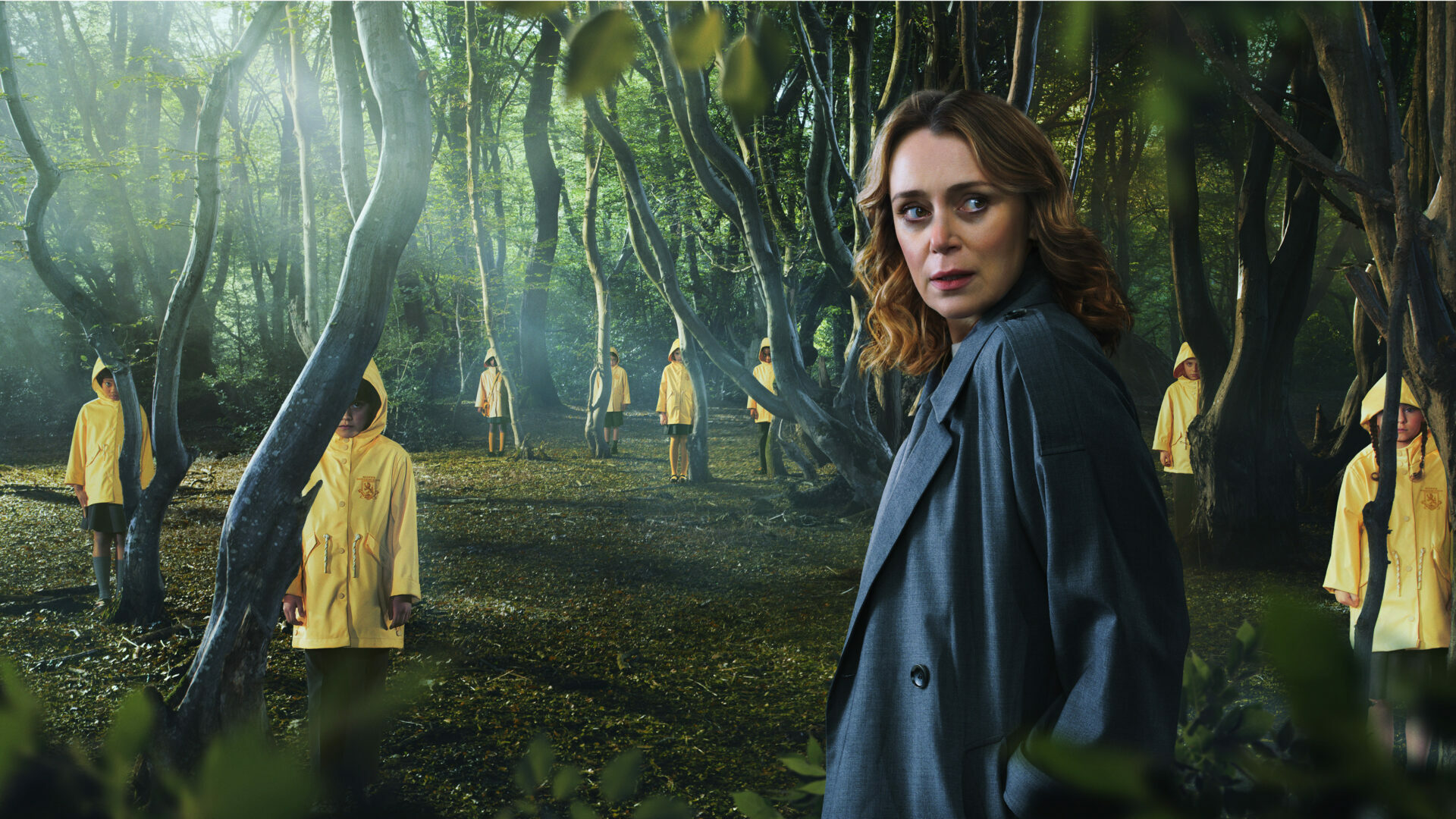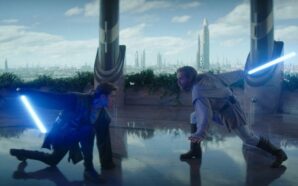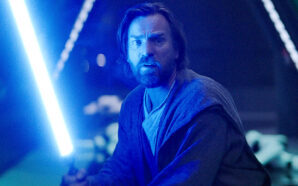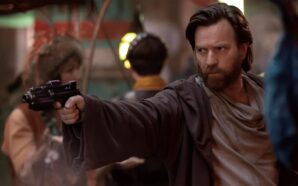“It makes one long for H.G.’s straightforward Martians. This would seem to be one of those unfortunate situations where no solution is morally defensible.”
With his 1957 novel The Midwich Cuckoos, John Wyndham sought to write a different kind of alien invasion story. One in which our children were the invaders, metaphorically in the rise of a new generation alien to our own and literally considering they are parasitic brood extraterrestrials implanted into women during a freak blackout one summer night. Part satire on British life, lambasting village gossip and taboo subjects, and part moral and philosophical examination of humanity’s place in the universe: the cosmic fear we hold of being usurped by nature, or supernature. It’s heady sci-fi, exploring everything from group think vs individualism to evolution. A story designed to actively, yet lovingly, rebuke those simple invasion stories of H.G. Wells. Sky’s recent seven-part television series forsakes the majority of these ideas, paying mere lip service to some, and ends up being a disappointingly simple and straightforward story counter to that of the novel.
Yet, as stated, the sci-fi ‘invasion’ narrative is just one half of The Midwich Cuckoos. The other is a satirical look at topics, many of which were taboo when the novel was published, surrounding pregnancy and child-rearing. The brood parasites offer the chance to explore teenage pregnancy, sex outside wedlock, and abortion. In this respect, the novel was dying for a new adaptation which could modernise these topics for the 2020s, but the series wastes the opportunity after initially seeming like it’ll embrace it. For example, being a novel written by a man in the 1950s, it has an overwhelming male perspective, with the opinions and feelings of the village’s women either ignored or told second-hand. Given the focus on pregnancy, female insight is a welcome addition to the television series, but just making the change doesn’t mean much if you don’t do anything with it. This series could have been like The Leftovers, beginning with a supernatural event and then focusing on the real, human consequences in a thematic way, but instead it is too caught up in its basic sci-fi plotting.
The series is perfectly set up to explore topics surrounding race but doesn’t dare progress with it. An interracial couple moves to a very white conservative neighbourhood, perfect for the theme of alienation and acceptance. A black father raises a white kid, a literal alien, and this could have been a story about denying or accepting children. The character could come to terms with the idea that adopted children are just as valid as biological, or fight against it. Real social issues reflected through a sci-fi prism as an update of the novel. The show puts the pieces in place for this but refuses to play with them.
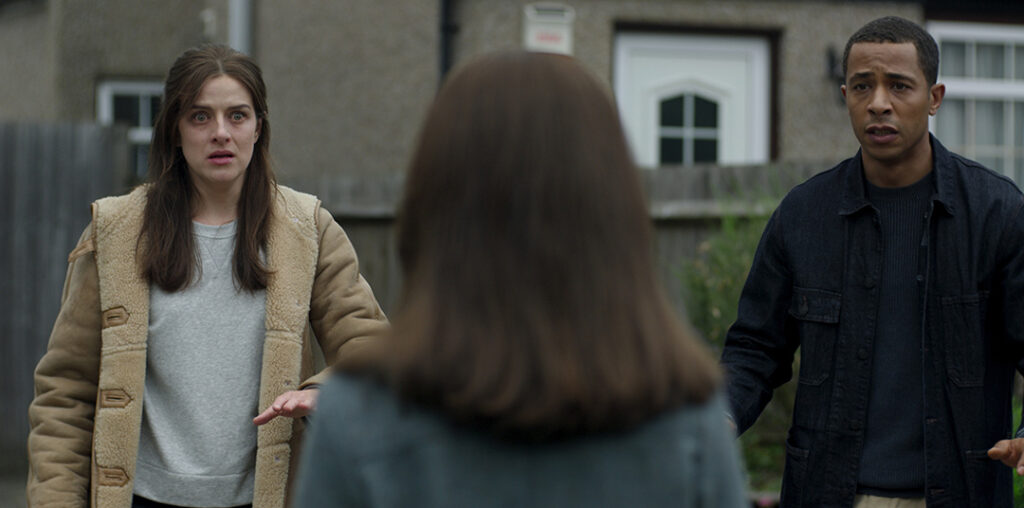
A man’s pregnant wife dies during the blackout and he invites his wife’s sister, pregnant with an alien child, to live with him in his own twisted brood parasitical relationship. I loved when the series introduced this. What a good idea! And an idea it remains, left unexplored, barely touched on. The same is true for a religious gay woman in town, now suddenly, immaculately, pregnant. What a fascinating character to see this issue through the lens of. She could have had the most interesting perspective in the show, fertile for introspection. But no, she’s a big part of the first episode and then relegated to a cameo for the rest of the series.
Likewise, the series was poised to delve into teenage pregnancy, modernising the theme from Wyndham’s novel. All girls and women old enough to bear children become pregnant so this of course means several schoolgirls find themselves affected. In one of the show’s best moments, a village meeting is interrupted with the arrival of these schoolgirls, all in uniform to highlight the issue, shocking many residents to the supernatural event that has occurred. This is what convinces the villagers to sign NDAs – to protect these young girls. And then we don’t see any of them again except one, Nora, briefly. Why not make this the core of an episode, or a thread throughout the whole series, rather than a solitary scene. In the same episode, lip service is paid to abortion as three characters consider it for all of five minutes before swiftly moving on. The first half of the novel is about these social issues, explored through science fiction, but the show wants to rush to the babies being born by the end of episode two so it can become a lame ‘creepy kid’ horror show.
The novel had a real sense of community and a quaint Britishness at its heart, perfectly contrasting with the more grandiose cosmic ideas, but this is missing from the show. I don’t get the sense these characters live near each other or know each other. I wish the show was gossipier, like the book. That people were always watching each other, being nosy and discussing people behind their backs. Something like the ‘Greek Chorus’ police interviews spliced throughout Big Little Lies wouldn’t have gone amiss. At one point we see a character typing up a note from a group meeting, “a togetherness is forming. The strangeness of their situation seems to be bringing the mothers closer.” Why is this a note we can read but not actually presented in the show? We need to see these people bond to believe it, not just read about it. Although reading expository notes is better than much of the soap opera-quality acting on display.
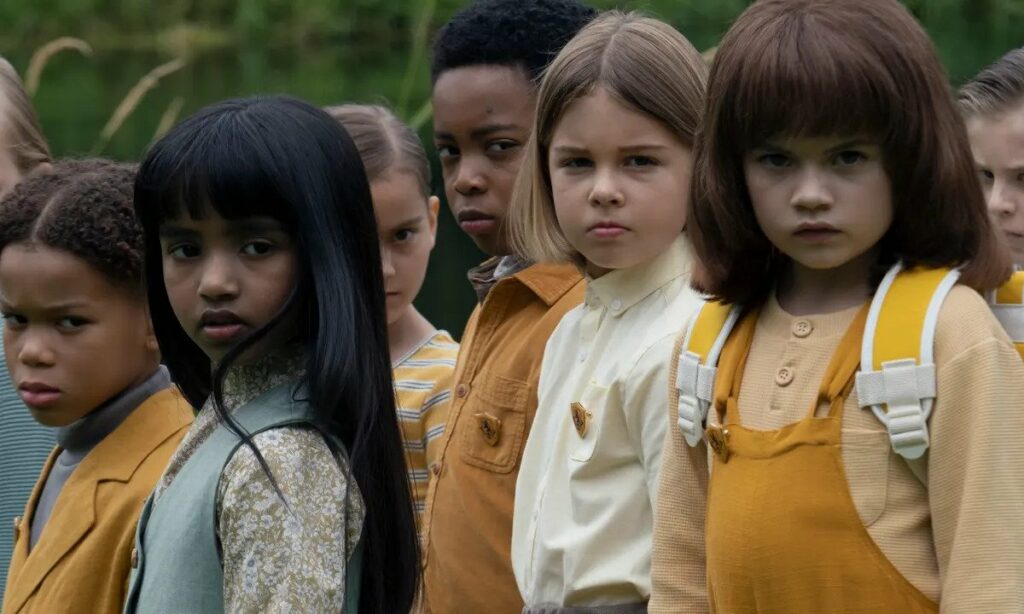
The novel’s protagonist is simply an observer to the events in Midwich, keeping a log on everything happening, which isn’t suitable for television. In the show, Keeley Hawes plays the lead character, Susannah Zellaby, and is seemingly much more active. Yet her role as a child psychologist means she has nothing to do while the women are pregnant so the show has to rush through that potentially fascinating period. The series is not interested in the big ideas, whether social, satirical, or science fiction. It wants to keep things simple and so takes more inspiration from the novel’s previous adaptation, Village of the Damned, than the book itself. Why tackle complex philosophical questions when kids being creepy and violent is enough? The issue is, I don’t think it is enough. The show skips forward three years, past the parents discovering the weird psychic powers the kids possess, just so we can see those powers in action.
By the end of the third episode, the kids are making shush gestures in a creepy way and murdering people. They are simply and easily presented as the bad guys, very much unlike the novel. In the book all the kids do is respond. An accidental pin prick on a baby is returned on purpose to the parent. A kid is run down by a car and they make the car crash into a wall. The kids are reactionary, not malicious. A stimulus is sent their way and they return an equal one in kind. The humans fuel every conflict because the story is not about invasion in the traditional sense. This isn’t a battle. The horror is evolutionary in nature, the humans fear that they are no longer on top of nature’s hierarchy, and we see how they flail violently in response. In the show its just evil creepy kids being a constant active threat and hurting people. Although they may just be getting revenge on their parents for giving them laughable haircuts. Most of the scenes of the kids attacking their parents end up being funny rather than scary. The swing scene is unintentional comedy gold.
The finale completely derails The Midwich Cuckoos, turning Wyndham’s excellent story into something exceedingly generic. Wescott, the government official in charge of watching over Midwich, is revealed to be an alien himself. It’s a twist for a twist’s sake, muddying the thematic waters. So, is it now a parable for parents pushing their issues onto their children? Generational trauma? Of course not, the show refuses to be about anything. The kids embrace their telekinetic powers and have blood dribbling from their noses while doing so, making it just like every other psychic kid story ever. After ignoring every potential subject it could explore, the series becomes the simplistic invasion story Wyndham purposefully wanted to quash. The quote I began this article with is destroyed. The kids are now simple bad guys trying to take over the world by mind-controlling the army. And, opposite to the book, there is only one option which is morally defensible: blowing them up. It’s the same endpoint as the novel but the context and reasoning are totally different. The kids go up in smoke, much like the series. What a waste of a great novel ripe for an updated modern take.
What are your thoughts on The Midwich Cuckoos? Let me know in the comments and be sure to geek out with me about TV, movies, and video-games on Twitter @kylebrrtt.




